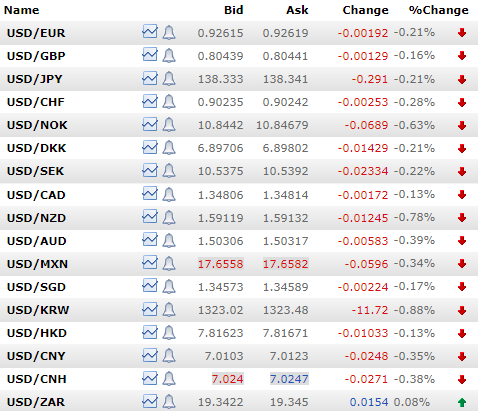Debt Ceiling Uncertainty a Risk to U.S. Dollar Reserve Hegemony - NY Fed Hints
- Written by: James Skinner
-
"For the dollar to maintain its status, it is important for U.S. elected officials and other policymakers to make decisions that instill confidence in our economy and institutions" - New York Fed.

Image © Federal Reserve Bank of New York. Markets Briefing Room: The Markets Group's Market Operations, Monitoring and Analysis (MOMA) area is the Federal Reserve System's nerve center for market intelligence gathering and dissemination.
The debate in Washington over the U.S. government debt ceiling could be a risk to the hegemonic status of the Dollar, the Federal Reserve Bank of New York (FRBN) hinted this week while imploring elected officials to "make decisions that instill confidence in our economy and institutions."
Policymakers and officials at the New York division of the Federal Reserve are responsible for many important tasks including some that "tie directly to the importance of the dollar in the international monetary system," such as managing the U.S. government's own currency reserves.
The NY Fed also caries out currency transactions involving the foreign exchange reserves of other countries and overseas central banks, which is another way of saying that it's something like the world headquarters of the global currency market in which the U.S. Dollar is the most widely held reserve asset.
"But as the global financial system continues to evolve, there is frequent discussion of potential ways these roles can be challenged," says Michelle Neal, head of the Markets Group at the bank, in opening remarks at the "2nd Annual International Roles of the U.S. Dollar Conference," on Thursday.
"Recent years have been characterized by investor interest in other reserve currencies, less traditional alternatives, such as central bank digital currencies and other digital assets, and even commodities, such as gold. With this in mind, the central role of the U.S. dollar should not be taken for granted," she added.

Above: Selected interbank reference rates for U.S. Dollar pairs on Friday. Source: Netdania.
Neall concluded when opening the two-day conference that "For the dollar to maintain its status, it is important for U.S. elected officials and other policymakers to make decisions that instill confidence in our economy and institutions."
The conference took place against a backdrop of optimism that an agreement to raise the legislative limit on U.S. government borrowings could be struck before an estimated "x-date," which is when empty coffers would leave the executive facing a choice between closing parts of the government and default.
"We’re going to continue these discussions with Congressional leaders in the coming days until we reach an agreement. And I’ll have more to say about that on Sunday, when I’m going to have a press conference on this issue," the White House said on Thursday.
The U.S. Treasury reached its debt limit on January 19, 2023, leaving it reliant on incoming tax receipts and other extraordinary measures to remain funded.
Negotiations over the debt limit are an annual affair but one that has been complicated this time around by the governing party's loss of its congressional majority in the mid-term elections, which has seen the Republican Party become kingmakers in the budget process.
But while an unprecedented failure to raise the debt limit would risk a technical debt default with potentially very bearish implications for the U.S. Dollar, there might also be downside risks to the greenback arising as a result of any agreement reached.
This is because of political differences in Washington over how to make the public finances more sustainable, with the governing party looking for large tax increases while the Republican Party seeks cuts in welfare and social spending.
Either of these might help reduce the budget deficit but each could also adversely impact the economy in some ways, as tax increases are widely said to deter investment, while cuts to welfare programmes would drain spending from the economy quicker than most other measures as low-income households are known to spend the largest share of their incomes while saving the least.
Hence there might be economic risks stemming from an agreement, risks which could ensure an end of the Fed's interest rate cycle or even invite interest rate cuts sooner than in other parts of the world while potentially weighing on the U.S. Dollar as a result.
"According to Moody’s, under McCarthy’s legislation, 780,000 Americans will lose their jobs and our nation’s unemployment rate will surge," said Maxine Waters, chair of the House Financial Services Committee.
"Republicans must put an end to this needless political theater and raise the debt limit as they did three times with no problems under the twice-impeached and now indicted former President Donald Trump, who signed $4.7 trillion in new deficits into law," she added in an April speech.

